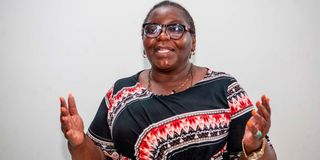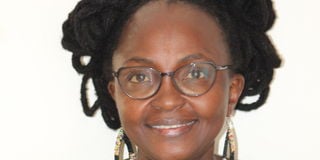Two women, two decades strong: A testament to life, love and hope with HIV

Anne Okaro pictured on November 26, 2024 at Nation Centre in Nairobi.
What you need to know:
- Two mothers, diagnosed with HIV in 2004, transformed their devastating diagnosis into a powerful mission of hope and advocacy across Kenya.
- Jacque Wambui and Anne Okaro, who once wrote goodbye letters to their children, have not only survived but thrived for two decades, raising their families while helping thousands of others navigate life with HIV.
Twenty years ago, two mothers heard words that felt like a death sentence: "You are HIV positive." In that moment, neither woman imagined she would live to see her children grow up, let alone become a powerful voice of hope for others. Yet today, Jacque Wambui and Anne Okaro stand as living testaments to how far HIV treatment and support have come – and how far determination and courage can take you.
Their journeys, marked by initial despair but transformed into triumph, mirror the stories of countless women across Africa. But these two mothers chose to do more than survive – they chose to thrive, turning their diagnosis into a mission to ensure no other woman walks this path alone.
As Jacque Wambui opens her hotel room curtain windows on a bright Thursday morning, the rising sun paints the blue Kericho skies in brilliant hues. A smile of pride crosses her face as she steps toward the window, breathing in the fresh air from the verdant tea farms below. This quiet moment, before her morning shower and the day's work ahead, feels like a victory – one of many she's earned over two decades.
If not for her work commitments, the mother of four would be home in Kilifi County with her children. But her journey has taken her far from where she started, and further still from where she thought she'd end up.
Growing up, young Jacque dreamed of studying tour and travel, imagining a life exploring the world. When those plans fell through due to insufficient points for certification, she found herself in the beauty industry instead, working as a beauty products sales-person before life led her down an unexpected path – HIV advocacy.
Now, at 52, Jacque has achieved her heart's desire in ways she never imagined. As the regional community advisory board coordinator at Afrocab Treatment Access Partnership, she travels across the globe, sharing vital HIV-related information and ensuring people living with HIV in Sub-Saharan Africa have access to optimal treatment.
"My life is now a book because everybody around me knows that I am living with HIV," Jacque says, her voice carrying both vulnerability and strength.

Jacque Wambui who has lived with HIV for 20 years.
Twenty years ago, such a future seemed impossible. The moment when a blood sample from her finger showed two red lines on an HIV testing kit marked what she thought was the end. Despite her independence, her job, and her ability to provide for her three children with the help of a nanny while she worked at a Nairobi beauty shop, those test results seemed to destroy everything.
"By the time I got home that evening, my body had started going down. I became weak and I told my house help that I was not feeling well, so I took a shower and went straight to bed," she recalls, the memory still vivid.
When morning came and she didn't rise for work, her concerned house help secretly alerted her parents, who lived nearby. "When I woke up that morning, I found my mom sitting next to me and I told her that I tested for HIV and it turned out positive. So, I requested her to allow me to go back home, and we packed then left together with her. I was ready to die next to my parents," Jacque says, remembering her fears of HIV in 2004.
The timing was particularly cruel. Already separated from a relationship that didn't work out, Jacque had recently lost the father of her children. His death amplified her fears about her own mortality. Though she valued her job as her only source of income and her children's sustenance, the HIV diagnosis left her feeling helpless.
"When I was told that I am HIV positive, I never envisioned 20 years. I was bedridden for a long time because of delayed diagnosis," Jacque narrates. The symptoms had started showing even before her test – skin rashes that multiplied into a cascade of health challenges so numerous that even now, she hasn't managed to document them all in the book she's long wanted to write.
"When I was bed-ridden, I had bed sores, there was a time I had pneumonia and typhoid. There was a time when I could not speak, my speech was slurred because my tongue was always heavy. I also lost my eyesight just after diagnosis, and it recurred when I was diagnosed with TB, to this day, I only have 20-20 vision in my right eye. Usually, it was the sore throat, and mouth sores, my body was weak, I didn't even feel like dressing up for work," she recounts.
The battle against opportunistic infections was relentless. Tuberculosis required a demanding treatment regimen – two months of intensive therapy followed by eight months of continued medication before she could start antiretroviral therapy (ARVs) in 2006. At 34, with three children depending on her, she committed to the prescribed regimen: three ARV drugs, two in the morning and one at night.
"Taking drugs for so long is tiring and demanding. Therefore, there is a need to have a proper support system to take medication every day. HIV is no longer the death sentence that they told us. It is manageable," she emphasises.
After two years away from work, Jacque found new purpose in supporting others struggling with their HIV status. With her parents' unwavering support, she maintained her treatment regimen and enrolled in an HIV counselling and training course, opening doors to advocacy work.
Her dedication to treatment led to achieving Undetectable equals Untransmittable (U=U) status, enabling her to have her fourth child – born HIV-negative 15 years ago. "I had enrolled in a program where I would be getting supplementary milk because in those days we used to be given formula milk for the babies. My baby was very healthy and heavy having weighed 3.8 kilograms at birth. He was not on Prophylaxis and after six months the test showed my baby was HIV negative, I screamed with joy," says the proud mother of four.
Today, Jacque's treatment has evolved significantly. For over seven years, she's been on a single daily dose – a game-changing development, though not without its challenges. "At first I kept feeling that I had not done something in the morning. Then when I switched from evening to morning, because I used to have my alarm at 10pm, I was always alert but I did not have anything to do at that time. I had to start focusing in the morning and so mentally I got a little bit disoriented," she explains.
The single-dose medication, while causing temporary side effects like insomnia that typically subsides after six months, has transformed her daily routine. "The other side-effect is weight gain but to me, it is better to be healthy than skinny so that people don't say that we've gone back to Aids. I think that the weight gain side effect was like an advantage because we look very nice and healthy," she says, her face brightening with a smile.
Her parents' support proved invaluable during her eight-year stay with them. "My late mom went out of her way to take care of me and my dad would always ensure that I was comfortable. Every day he would call home before he came back from work just to know how I was doing. In the evening he used to bring me medication for my current ailment and anything he felt could keep me alive," Jacque remembers fondly.
Across the city in Nairobi, another story of resilience unfolds. Anne Okaro's home on Kagundo Road fills with the joyful sounds of grandchildren singing birthday songs on a bright Tuesday. Every November 26, marks not just her birthday but another year of living positively with HIV – now two decades strong.
Widows and widowers
"I have struggled with my children. I have seen them grow, we've grown together because by the time my husband was dying, I was only 35 with five children aged three, six, nine, 12 and 15 in Nairobi. I did not know where to go, I had to pay bills, and take them to school," she reflects.
The memories of weekend market trips with her late husband and joyful holiday celebrations remain precious. These treasured moments led to her decision to never remarry. "I finished all the traditions at home exclusive of being inherited," she states firmly.
As a teacher, Anne returned to Nairobi with her children after her husband's burial, determined to maintain their education despite her grief. A fortuitous workshop organised by the Teachers Service Commission and the Ministry of Education, targeting widows and widowers, proved life-changing. The week-long training in Nairobi's Kasarani covered HIV treatment, prevention, care, nutrition, and adherence.
"Later on when I was ready to face whatever would come my way, I went to Liverpool VCT, and took the test and it turned positive. I was devastated, I felt lonely, I felt like the world was blank," she recalls of her 2004 diagnosis.
Support came through the Kenya Network of HIV-Positive Teachers and her mentor from the Teachers Service Commission, who was also a member of Women Fighting Aids in Kenya. Her involvement grew into leadership – she served as a board member of the network for 15 years.
Opportunistic diseases
"Being on a board of Women Fighting Aids in Kenya opened my mind to administration in governance, resource mobilisation, and quality capacity building. I did my first research through Amref in Nakuru County on factors that influence the high HIV/Aids infections among adolescents between 10 and 24 years," she says proudly.
Now 54, Ann has maintained viral suppression through consistent treatment adherence for two decades. She finds fulfilment in supporting students and fellow teachers, proving that life continues beyond an HIV diagnosis. Having lost friends and relatives to HIV, she approaches each day with purpose, sharing vital information about treatment adherence and positive living.
"Every time we are approaching World Aids Day, I imagine if my husband was around. If I were asked by the people to come back into my life having died of HIV, I would ask for my husband ten times so that we journey together and live positively," says the mother of five.
"Now we are seeing a large number of HIV-positive people turning up in health facilities with Advanced HIV opportunistic diseases, caused by mainly late diagnosis and dropping out of Antiretroviral therapy care. If you know somebody who is infected, keep them close and encourage them to take their medication," Jacque emphasises, her words carrying the weight of 20 years of experience and hope.





